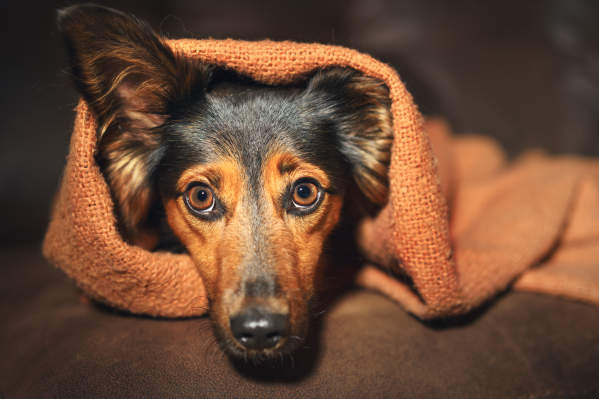Is your pup pacing through the night and acting restless during the day? Maybe they seem uneasy, but it’s tough to tell what’s going on when there’s no apparent cause. You may be wondering—does my dog have anxiety? If only our dogs could talk!
Sometimes, there’s a clear cause of anxious behavior: a thunderstorm, a windy day, or a strange new guest. But regardless of the cause, anxiety is stressful for both the dog and pet parent.
Read on to learn how to identify the symptoms of anxiety in dogs, if there's a root cause you need to address, and how you can fix the problem so you and your fur friend can feel calm, cool, and collected.
Signs your dog has anxiety
There are a variety of anxiety-related symptoms that dogs may exhibit, including:
Panting
Pacing
Restless behavior
Destructive behavior
Drooling
Accidents
Non-stop barking
Aggression
Compulsive behaviors (e.g., obsessive licking)
You’re probably thinking—my dog has definitely done something on this list at least once in their life—how can I tell whether the root cause is anxiety?
Certified Dog Trainer and Counselor Kristi Benson, who has experience working with fearful dogs, explains that paying attention to body language is vital, but it’s also possible for symptoms that appear to be anxiety-based to be the result of illness or physical ailments. She recommends consulting a professional trainer with experience treating fear and anxiety issues and making an appointment with a trusted veterinarian to assess and handle potential nervousness.
Jessica Char, a Certified Professional Dog Trainer, who owns Canine Engineering, says that dogs, in addition to exhibiting the symptoms listed above, may also stay glued to their pet parents, find places to hide, or avoid specific triggers in anxious moments.
Why is my dog anxious?
There are a few reasons your dog may be experiencing discomfort and anxiety. These include:
Genetics
A certain person, event, or situation
Pain or discomfort
Genetics
Pups with anxious parents are at higher risk of developing anxiety as they mature. The behavioral experts I contacted for this piece say that anxiety can crop up at any time during a dog’s teen years—until the dog is about two or three.
In adult dogs, sudden anxiety may be a sign of a medical issue and should be checked by a veterinarian. It's also important to note that certain breeds are more prone to anxious behavior. For example, hunting dogs who are bred to be at constant attention are predisposed to nervousness.
A certain person, event, or situation
Dogs may become anxious for a number of other reasons. Separation is a common cause of anxiety in dogs, but this typically resolves once the pet parent has returned.
Trauma is another root cause of dog anxiety. A dog who has experienced an abusive past or has been suddenly abandoned is a lot more likely to be fearful and jittery than a dog with an uneventful upbringing.
Poor socialization is also a potential reason for anxiety, as well as physical and environmental causes. For example, loud noises or a raucous crowd at a house party could very well be the culprit of your dog's anxiety.
Pain or discomfort
In some cases, pain may be causing your dog to exhibit signs of what looks like anxiety, but in reality, they’re experiencing discomfort. If your dog is acting strange and it seems to have come out of nowhere, take them to your veterinarian to get a proper diagnosis.
How to help a dog with anxiety
As pet parents, we hate to watch our furry friends in distress. So how can you help a dog with anxiety? First things first—don't enact any kind of punishment. Don’t yell or scold your pet. They’re clearly struggling and feeling uncomfortable, so they don’t need additional stress at the moment.
What you can do is expose your dog, in small doses, to the fear-inducing object or situation (if possible) while also supplying delicious, irresistible treats. It’s a process that requires a lot of patience and often the help of a trainer, but it can help change your dog’s feelings toward something they’ve feared.
It's also recommended that you comfort your dog in times of stress. Parents don’t ignore or scold their children who jolt out of bed because of nightmares, so why would you do the same to your favorite non-human companion? It’s not a solution to the anxiety, but there’s no downside to comforting a nervous animal. Be sure to give your dog space, too. If your fur pal wants to run and hide, don’t force them to stay in the area or close to the thing that’s making them uncomfortable.
Sometimes, having more than one dog may soften the blow of being left alone—that pack mentality can help them feel more secure. There are also supplements or medications that can complement the training if your veterinarian recommends it.
At the end of the day, there’s no quick fix for dog anxiety problems, but with the help of training and veterinary assistance, your dog can overcome their nervousness. If you're not sure about next steps, reach out to the team at Pawp—we're here to help 24/7.
